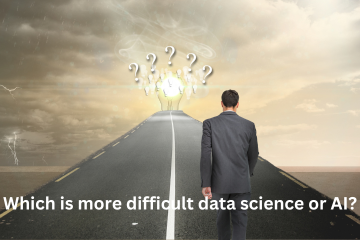The fields of data science and artificial intelligence (AI) are closely related but distinct from each other. While there is some overlap in the skills and techniques used in both fields, they have different focuses and challenges.
Data science is a multidisciplinary field that involves extracting insights and knowledge from data using various statistical and analytical techniques. It encompasses tasks such as data cleaning, exploration, visualization, and modelling. Data scientists work with large datasets and employ statistical and machine learning algorithms to analyse data and make predictions or drive decision-making.
AI is a broader field that involves the development of intelligent systems that can perform tasks that typically require human intelligence. AI encompasses various subfields, including machine learning, natural language processing, computer vision, and robotics. AI aims to create systems that can perceive, reason, learn, and interact with their environment.
Determining which field is more difficult between data science and AI is subjective and depends on various factors, including an individual’s background, interests, and the specific tasks or problems they are working on. Both fields require a solid foundation in mathematics, statistics, and programming. Data science may be considered more focused on extracting insights from data, whereas AI involves the development and application of intelligent systems.
Are you looking to become a Data science expert? Go through 360DigiTMG’s in Best Data Science in Bangalore
Let’s delve deeper into the challenges and considerations within both data science and AI by exploring specific subheadings.
Data Science Challenges:
Data Acquisition and Preparation: Data scientists often face difficulties in acquiring relevant and high-quality data. They need to identify the right sources, clean and preprocess the data, handle missing values, and ensure data consistency and integrity.
Feature Selection and Engineering: Determining the most informative features from the available data and creating new features that capture meaningful patterns or relationships can be a complex task. Feature engineering requires domain knowledge and creative thinking.
Model Selection and Evaluation: Selecting the appropriate models and algorithms that fit the problem at hand is crucial. Data scientists need to understand the strengths and limitations of various models and evaluate their performance using suitable metrics, cross-validation techniques, and statistical tests.
Interpretability and Explainability: As data-driven decisions gain importance, understanding and interpreting the models become critical. Explaining the results and predictions of complex models to stakeholders, especially in regulated domains, can be challenging.
AI Challenges:
Earn yourself a promising career in Best Data Scientist by enrolling in Best Data Science in Chennai Program offered by 360DigiTMG.
Complexity and Scalability: Building AI systems requires handling complex algorithms and architectures. Designing and implementing deep neural networks, reinforcement learning algorithms, or natural language processing models often involve significant computational resources and advanced techniques.
Data Availability and Quality:
AI systems typically require large volumes of labeled training data to achieve high performance. Collecting and annotating such datasets can be time-consuming and expensive. Ensuring the quality and representativeness of the data is also essential to avoid biased or skewed models.
Ethical and Legal Considerations: AI applications raise important ethical and legal concerns. Issues such as fairness, privacy, transparency, and accountability need to be addressed to ensure responsible AI development and deployment.
Robustness and Generalization: Ensuring that AI systems perform well in real-world scenarios and generalize beyond the training data is a challenge. Models should be robust against variations, noise, and adversarial attacks. Overfitting, underfitting, and bias in the models are also common concerns.
Data Science Considerations:
Learn the core concepts of Data Science Course video on Youtube:
Domain Knowledge: Data scientists often need to possess domain-specific knowledge to understand the data and its context effectively. Having expertise in the field they are working in helps in identifying relevant variables, interpreting results, and making informed decisions.
Communication and Visualization: Data scientists must be skilled in effectively communicating their findings to both technical and non-technical stakeholders. They should be able to present complex data and analytical concepts in a clear and concise manner, using data visualizations and storytelling techniques.
Iterative Process: Data science projects often involve an iterative process of exploration, analysis, and refinement. Data scientists need to be comfortable with this iterative nature and be able to adapt their approach based on feedback and new insights.
Data Governance and Privacy:
Data scientists must adhere to ethical guidelines and privacy regulations when working with sensitive data. They should be familiar with data governance practices, understand data privacy concerns, and ensure proper anonymization and security measures are in place.
Looking forward to becoming a Data scientist Expert? Check out the Best Data Science in Pune and get certified today.
AI Considerations:
Algorithm Selection and Optimization: AI practitioners need to choose suitable algorithms and architectures based on the problem they are addressing. They must have a strong understanding of various AI techniques and be able to optimize and fine-tune models to achieve the desired performance.
Computational Resources and Infrastructure: Building and training complex AI models often require significant computational resources, including high-performance hardware and storage. AI practitioners should be familiar with distributed computing frameworks and cloud platforms to leverage scalability and efficiency.
Continuous Learning and Research: AI is a rapidly evolving field, and staying up-to-date with the latest research, techniques, and advancements is crucial. AI practitioners should have a passion for continuous learning, exploring new ideas, and participating in the broader AI community.
Natural Language Processing (NLP) and Understanding:
AI practitioners working on language-related tasks need expertise in NLP techniques, such as text classification, sentiment analysis, and named entity recognition. Understanding language nuances and developing models that can process and generate human-like text are crucial.
Skills in Data Science and AI:
Mathematics and Statistics: Both data science and AI require a strong foundation in mathematics, including linear algebra, calculus, probability theory, and statistics. These skills form the basis for understanding and developing models and algorithms.
Programming and Data Manipulation: Proficiency in programming languages such as Python, R, or Julia is essential for implementing algorithms, manipulating data, and building models. Knowledge of data manipulation libraries and frameworks like pandas and NumPy is also beneficial.
Becoming a Data science Expert! is possible now with the 360DigiTMGBest Data Science in Hyderabad. Get trained by the alumni from IIT, IIM, and ISB.
Machine Learning and Deep Learning: A solid understanding of machine learning algorithms, techniques, and frameworks is essential for both data science and AI. Knowledge of supervised and unsupervised learning, as well as deep learning architectures like neural networks, is highly valuable.
Problem-Solving and Critical Thinking:
Data scientists and AI practitioners need strong problem-solving and critical thinking skills to formulate and tackle complex problems. They should be able to approach problems analytically, break them down into manageable tasks, and devise innovative solutions.
Big Data Technologies: Dealing with large-scale datasets often requires familiarity with big data technologies such as Apache Hadoop, Apache Spark, and distributed computing frameworks. Understanding how to handle distributed storage, parallel processing, and scalability is valuable.
Data Science Placement Success Story
Data Science Training Institutes in Other Locations
Tirunelveli, Kothrud, Ahmedabad, Hebbal, Chengalpattu, Borivali, Udaipur, Trichur, Tiruchchirappalli, Srinagar, Ludhiana, Shimoga, Shimla, Siliguri, Rourkela, Roorkee, Pondicherry, Rajkot, Ranchi, Rohtak, Pimpri, Moradabad, Mohali, Meerut, Madurai, Kolhapur, Khammam, Jodhpur, Jamshedpur, Jammu, Jalandhar, Jabalpur, Gandhinagar, Ghaziabad, Gorakhpur, Gwalior, Ernakulam, Erode, Durgapur, Dombivli, Dehradun, Cochin, Bhubaneswar, Bhopal, Anantapur, Anand, Amritsar, Agra , Kharadi, Calicut, Yelahanka, Salem, Thane, Andhra Pradesh, Greater Warangal, Kompally, Mumbai, Anna Nagar, ECIL, Guduvanchery, Kalaburagi, Porur, Chromepet, Kochi, Kolkata, Indore, Navi Mumbai, Raipur, Coimbatore, Bhilai, Dilsukhnagar, Thoraipakkam, Uppal, Vijayawada, Vizag, Gurgaon, Bangalore, Surat, Kanpur, Chennai, Aurangabad, Hoodi,Noida, Trichy, Mangalore, Mysore, Delhi NCR, Chandigarh, Guwahati, Guntur, Varanasi, Faridabad, Thiruvananthapuram, Nashik, Patna, Lucknow, Nagpur, Vadodara, Jaipur, Hyderabad, Pune, Kalyan.
Data Analyst Courses In Other Locations
Tirunelveli, Kothrud, Ahmedabad, Chengalpattu, Borivali, Udaipur, Trichur, Tiruchchirappalli, Srinagar, Ludhiana, Shimoga, Shimla, Siliguri, Rourkela, Roorkee, Pondicherry, Rohtak, Ranchi, Rajkot, Pimpri, Moradabad, Mohali, Meerut, Madurai, Kolhapur, Khammam, Jodhpur, Jamshedpur, Jammu, Jalandhar, Jabalpur, Gwalior, Gorakhpur, Ghaziabad, Gandhinagar, Erode, Ernakulam, Durgapur, Dombivli, Dehradun, Bhubaneswar, Cochin, Bhopal, Anantapur, Anand, Amritsar, Agra, Kharadi, Calicut, Yelahanka, Salem, Thane, Andhra Pradesh, Warangal, Kompally, Mumbai, Anna Nagar, Dilsukhnagar, ECIL, Chromepet, Thoraipakkam, Uppal, Bhilai, Guduvanchery, Indore, Kalaburagi, Kochi, Navi Mumbai, Porur, Raipur, Vijayawada, Vizag, Surat, Kanpur, Aurangabad, Trichy, Mangalore, Mysore, Chandigarh, Guwahati, Guntur, Varanasi, Faridabad, Thiruvananthapuram, Nashik, Patna, Lucknow, Nagpur, Vadodara, Jaipur, Hyderabad, Pune, Kalyan, Delhi, Kolkata, Noida, Chennai, Bangalore, Gurgaon, Coimbatore.
For more information
360DigiTMG – Data Analytics, Data Science Course Training Hyderabad
Address – 2-56/2/19, 3rd floor,,
Vijaya towers, near Meridian school,,
Ayyappa Society Rd, Madhapur,,
Hyderabad, Telangana 500081
099899 94319
https://goo.gl/maps/sn21C9xFtMbCr4qm8
Source Link : What are the Best IT Companies in Uppal



